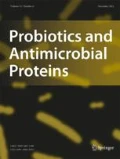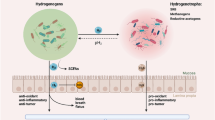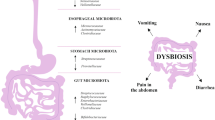Abstract
Based on the ability of the probiotics in the gut microflora modification, they can have the beneficial effects on diseases in the short and/or the long term. In previous study, we revealed that unlike Bifidobacterium bifidum, the amount of Lactobacillus acidophilus remained almost unchanged in mice gut microflora in the long term, indicating more stability of L. acidophilus than B. bifidum which can be used to prevent some incurable diseases such as cancer. Thirty-eight male BALB/c mice were divided into four groups, control, azoxymethane (AOM), L. acidophilus, and B. bifidum probiotics, to evaluate the protective effects of the probiotics on AOM-induced mouse colon cancer. Except for the control group, the rest of the animals were weekly given AOM (15 mg/kg, s.c) in three consecutive weeks. Colon lesion incidence was 74% in the AOM group in comparison with the control (0%) (P < 0.05). The lesions were varied from mild to severe dysplasia and colonic adenocarcinoma. Administration of the probiotics inhibited the incidence of colonic lesions by about 57% in L. acidophilus (P < 0.05) and 27% in B. bifidum (P > 0.05) compared to the AOM group. The serum levels of CEA and CA19-9 tumor markers were significantly decreased in L. acidophilus in comparison with the AOM group (P < 0.05). Moreover, the serum levels of IFN-γ and IL-10 and the number of CD4+ and CD8+ cells were significantly increased in L. acidophilus compared to AOM (P < 0.05). Our study highlighted the more potential effects of L. acidophilus probiotic than B. bifidum on mouse colon cancer.




Similar content being viewed by others
References
Guarner F, Malagelada J-R (2003) Gut flora in health and disease. Lancet 361:512–519
O'mahony L, Feeney M, O'halloran S, Murphy L, Kiely B, Fitzgibbon J, Lee G, O'sullivan G, Shanahan F, Collins J (2001) Probiotic impact on microbial flora, inflammation and tumour development in IL-10 knockout mice. Aliment Pharmacol Ther 15:1219–1225
Davis CD, Milner JA (2009) Gastrointestinal microflora, food components and colon cancer prevention. J Nutr Biochem 20:743–752
Alizadeh AM, Afrouzan H, Dinparast-Djadid N, Sawaya AC, Azizian S, Hemmati HR, Mohagheghi MA, Erfani S (2015) Chemoprotection of MNNG-initiated gastric cancer in rats using Iranian propolis. Arch Iran Med 18:18–23 doi:0151801/aim.006
Alizadeh AM, Khaniki M, Azizian S, Mohaghgheghi MA, Sadeghizadeh M, Najafi F (2012) Chemoprevention of azoxymethane-initiated colon cancer in rat by using a novel polymeric nanocarrier--curcumin. Eur J Pharmacol 689:226–232. https://doi.org/10.1016/j.ejphar.2012.06.016
Abreu MT, Peek RM Jr (2014) Gastrointestinal malignancy and the microbiome. Gastroenterology 146:1534–1546 e1533
Kailasapathy K, Chin J (2000) Survival and therapeutic potential of probiotic organisms with reference to Lactobacillus acidophilus and Bifidobacterium spp. Immunol Cell Biol 78:80–88
Ranji P, Akbarzadeh A, Rahmati-Yamchi M (2014) Associations of probiotics with vitamin D and leptin receptors and their effects on colon cancer. Asian Pac J Cancer Prev 16:3621–3627
Perdigon G, de Moreno DLA, Valdez J, Rachid M (2002) Role of yoghurt in the prevention of colon cancer. Eur J Clin Nutr 56:S65–S68
Urbanska AM, Bhathena J, Martoni C, Prakash S (2009) Estimation of the potential antitumor activity of microencapsulated Lactobacillus acidophilus yogurt formulation in the attenuation of tumorigenesis in Apc (Min/+) mice. Dig Dis Sci 54:264–273
Zhu Y, Michelle Luo T, Jobin C, Young HA (2011) Gut microbiota and probiotics in colon tumorigenesis. Cancer Lett 309:119–127. https://doi.org/10.1016/j.canlet.2011.06.004
Gopal PK, Prasad J, Gill HS (2003) Effects of the consumption of Bifidobacterium lactis HN019 (DR10TM) and galacto-oligosaccharides on the microflora of the gastrointestinal tract in human subjects. Nutr Res 23:1313–1328
Khavari-Daneshvar H, Mosavi M, Khodayari H, Rahimi E, Ranji P et al (2017) Modifications of mice gut microflora following oral consumption of Lactobacillus acidophilus and Bifidobacterium bifidum probiotics. Turk J Med Sci 47:689–6942
Alizadeh AM, Mohammadghasemi F, Zendehdel K, Kamyabi-moghaddam Z, Tavassoli A, Amini-najafi F, Khosravi A (2015) Apoptotic and proliferative activity of mouse gastric mucosa following oral administration of fumonisin B1. Iran J Basic Med Sci 18:8
Khaniki M, Azizian S, Alizadeh AM, Hemmati H, Emamipour N, Mohagheghi MA (2013) The antiproliferative and anticancerogenic effects of nano-curcumin in rat colon cancer. Tehran Univ Med J 71:277–284
Fareez IM, Lim SM, Zulkefli NAA, Mishra RK, Ramasamy K (2017) Cellulose derivatives enhanced stability of alginate-based beads loaded with lactobacillus plantarum LAB12 against low pH, high temperature and prolonged storage. Probiotics & Antimicrob Prot 1–15. https://doi.org/10.1007/s12602-017-9284-8
Chang JH, Shim YY, Cha SK, Reaney MJ, Chee KM (2012) Effect of Lactobacillus acidophilus KFRI342 on the development of chemically induced precancerous growths in the rat colon. J Med Microbiol 61:361–368. https://doi.org/10.1099/jmm.0.035154-0
Urbanska AM, Bhathena J, Cherif S, Prakash S (2014) Orally delivered microencapsulated probiotic formulation favorably impacts polyp formation in APC (Min/+) model of intestinal carcinogenesis. Artif Cells Nanomed Biotechnol 1–11. https://doi.org/10.3109/21691401.2014.898647
Chen CC, Lin WC, Kong MS, Shi HN, Walker WA, Lin CY, Huang CT, Lin YC, Jung SM, Lin TY (2012) Oral inoculation of probiotics Lactobacillus acidophilus NCFM suppresses tumour growth both in segmental orthotopic colon cancer and extra-intestinal tissue. Br J Nutr 107:1623–1634. https://doi.org/10.1017/s0007114511004934
Lee J-A, Ko J-H, Jung B-G, Kim T-H, Hong J-I, Park Y-S, Lee B-J (2013) Fermented Prunus mume with probiotics inhibits 7, 12-Dimethylbenz [a] anthracene and 12-O-Tetradecanoyl phorbol-13-acetate induced skin carcinogenesis through alleviation of oxidative stress. Asian Pac J Cancer Prev 14:2973–2978
Patel S, Goyal A (2013) Evolving roles of probiotics in cancer prophylaxis and therapy. Probiotics Antimicrob Proteins 5:59–67
Alizadeh AM, Shiri S, Farsinejad S (2014) Metastasis review: from bench to bedside. Tumour Biol 35:8483–8523
Dimitrijevic R, Ivanovic N, Mathiesen G, Petrusic V, Zivkovic I, Djordjevic B, Dimitrijevic L (2014) Effects of Lactobacillus rhamnosus LA68 on the immune system of C57BL/6 mice upon oral administration. J Dairy Res 81:202–207. https://doi.org/10.1017/s0022029914000028
Mahmoodi M, Alizadeh AM, Sohanaki H, Rezaei N, Amini-Najafi F, Khosravi AR, Hosseini S-K, Safari Z, Hydarnasab D, Khori V (2012) Impact of fumonisin B1 on the production of inflammatory cytokines by gastric and colon cell lines. Iran J Allergy Asthma Immunol 11:165–173
Rizzo A, Pallone F, Monteleone G, Fantini MC (2011) Intestinal inflammation and colorectal cancer: a double-edged sword? World J Gastroenterol 17:3092
Mahmoodi M, Alizadeh AM, Amini-Najafi M, Khosravi AR, Hosseini S-K, Safari Z, Hydarnasab D (2012) Effects of fumonisin B1 on the stomach and colon cell lines in vitro. Tehran Univ Med Sci 69(12):744–753
Dunn GP, Old LJ, Schreiber RD (2004) The immunobiology of cancer immunosurveillance and immunoediting. Immunity 21:137–148
Balomenos D, Shokri R, Daszkiewicz L, Vazquez-Mateo C, Martinez AC (2017) On how Fas apoptosis-independent pathways drive T cell hyperproliferation and lymphadenopathy in lpr mice. Front Immunol 8:237. https://doi.org/10.3389/fimmu.2017.00237
Cullen S, Brunet M, Martin S (2010) Granzymes in cancer and immunity. Cell Death Differ 17(4):616–623
Acknowledgments
This study was supported by Tehran University of Medical Sciences (Grant Number: 17733) and Iran University of Medical Sciences (Grant Number: 18890).
Author information
Authors and Affiliations
Corresponding author
Ethics declarations
Ethical Approval
All procedures performed in studies involving animals were in accordance with the ethical standards of the institutional and/or national research committee and with the 1964 Declaration of Helsinki and its later amendments or comparable ethical standards.
Conflict of Interest
The authors declare that they have no conflict of interest.
Rights and permissions
About this article
Cite this article
Agah, S., Alizadeh, A.M., Mosavi, M. et al. More Protection of Lactobacillus acidophilus Than Bifidobacterium bifidum Probiotics on Azoxymethane-Induced Mouse Colon Cancer. Probiotics & Antimicro. Prot. 11, 857–864 (2019). https://doi.org/10.1007/s12602-018-9425-8
Published:
Issue Date:
DOI: https://doi.org/10.1007/s12602-018-9425-8




